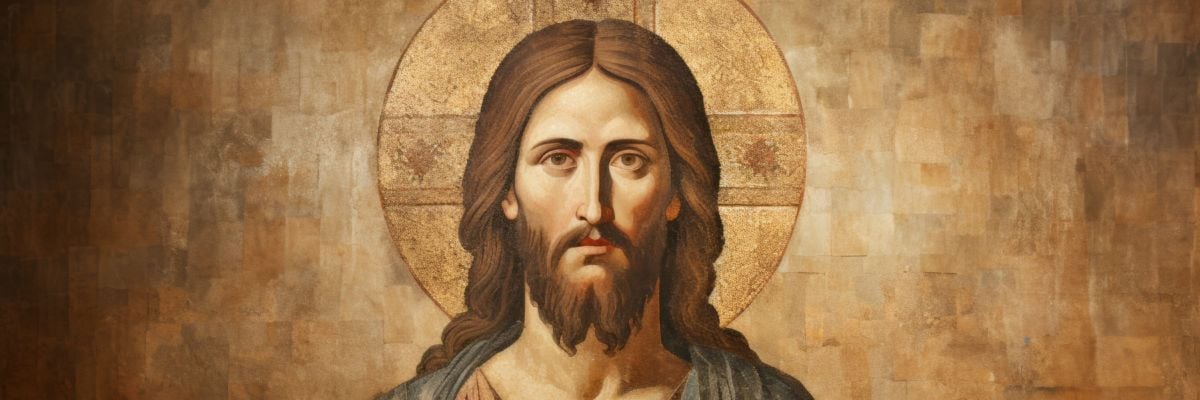
In this episode of Catholic Answers Live, Joe Heschmeyer joins Cy Kellett to answer a caller who asks a provocative question: Why are Catholics called “Catholic” if Jesus wasn’t? Joe responds by laying out the case that Jesus not only founded a visible, unified Church—but that everything about that Church points to Catholicism. In fact, Joe argues, there’s nothing Jesus could be besides Catholic.
Transcript:
Caller: My question basically, if Jesus Christ isn’t Catholic, then why are you guys Catholic?
Joe: What do you think Jesus is?
Caller: He’s holy.
Joe: Yeah, he is holy.
Caller: I know, I know. Earlier you mentioned a couple of times of like holiness or whatever. And like, even if you go like, what is it? First Peter 1:16, it says, because it is written, be holy, for I am holy. So that’s what God is.
Joe: Okay, so what does the word holy mean in the biblical context? It doesn’t just mean morally pure, it means being set aside. So it means pure in the sense of you could have like pure vinegar, meaning it’s undivided, it’s only vinegar. And so you wouldn’t want it mixed with something else because then it wouldn’t be pure anymore. So pure means like undiluted.
So one of the things we mean when we talk about Christ being holy and our call to holiness is to not be divided. We don’t want to be divided between worldly affairs and following Christ. We don’t want to be divided between sin and fidelity to God. We want to be undivided. That’s at the heart of holiness.
Well, in our call as Christians, we’re not just called individually, we are called individually, but we’re called to be united and undivided. That’s part of the nature of holiness in the biblical sense of holiness.
This, by the way, if you want to understand why there are those strange looking rules in the Old Testament, like you can’t have mixed fabrics because it’s not holy, it’s not pure, it’s divided. It’s two different things blended together. We don’t want that. We want purity because that’s at the heart of holiness. It’s consecration to God.
Like when God says that the ground that Moses is standing on is holy, when he sees God in the burning bush, it doesn’t mean that the ground was really morally well behaved. It means that the ground has been set aside for divine use in a way that it doesn’t share any profane, like worldly use.
So take that idea and then couple it with the idea that Christ comes to save not just you individually, but the flock. And he talks about wanting to have an undivided flock. And so he says in John chapter 10, verse 16, I have other sheep that are not of this fold, I must bring them also and they will hear my voice. So there shall be one flock, one shepherd.
So this whole idea that’s very popular today of either having a bunch of different Protestant denominations, or it doesn’t matter what you join, just follow Jesus individually, you don’t need to be part of a flock. Totally unbiblical, totally contrary to the idea of holiness in the sense of being undivided, we are to be radically one.
And so Jesus in John 17:20, he prays for the future disciples. He prays for you and me. And he says to the Father, I do not pray for these only, meaning the 12, but also for those who believe in me through their word, that’s us, that they may all be one, even as thou Father, art in me, and I am thee, that they also may be in us, so that the world may believe that Thou has sent me.
Two things. Number one, we are called to be perfectly one. Number two, one of the reasons we’re called to be perfectly one is because that’s critical for the proclamation of the Gospel. When non-Christians hear us say you should be Christian and then immediately disagreeing with one another on 30 different doctrines and saying, you should be a Methodist, you should be a Lutheran, you should be a fill in the blank, that is a genuine scandal.
And people say, you guys figure out your own thing and then come talk to me. And Jesus warned us that that was going to happen if we broke away from the one church. So we should be undivided, we should be one flock and all of these different flocks forming with different shepherds. That is absolutely contrary to Scripture, absolutely contrary to the will of Christ.
What would you say to that?
Caller: No, I agree with you on that. But my question still is like, I guess in the Bible, where does it say to be Catholic? Jesus himself was not Catholic.
Joe: Well, he founds the church, right? Matthew 16, he says, I will build my church. So if we want to be in the one flock, we should find out what church did Jesus found.
Now you are right, he doesn’t use the word Catholic for it. The first time we find the word Catholic being used for it is a few decades later, but not very long, right? Like there’s about a 17-year difference between when the last book of the Bible is written and the first time we see the word Catholic Church used to describe the church founded by Jesus.
But whether you want to call it the Catholic Church or not, it is a visible society led by the apostles here on earth. It is. He compares it to a city on a hill. Why a city? Because it’s organized. Why on a hill? Because it’s visible.
Like the church in the biblical sense doesn’t just mean vaguely all Christians everywhere, it means something more concrete. It means like a visible society with leaders, leaders chosen by God. Leaders who, I don’t know if you heard the conversation about apostolic succession last hour, but leaders who then instruct their followers to choose leaders and they pass on this authority to lead.
And so we can trace through history this leadership all the way down the line, down to Pope Leo and the bishops in union with him. So we can see from history where Jesus’ Church is. We can also see from history where it isn’t. Like, we can trace the various Protestant denominations back to the Reformation. Halloween 1517. Luther has the 95 Theses. There’s no Protestants before that.
You’ve got a few groups that are kind of split off that are sort of like Protestants, but we can trace where they come from as well. So my point is, like, if you want to find the one church so you can be part of the flock, so there can be one flock and one shepherd, well, go look and see, well, where did the church that Jesus founded end up in history? And it’s very easy.
So actually, if you want to stay on the line, I will give you a copy of my book, *The Early Church Was the Catholic Church*, that looks at that investigation, that says, what did these Christians before the year 200 believe? What did they practice? What did their church look like? And what can we conclude from that?
And as you can probably guess from the title, what we can conclude from that is that the early church was the Catholic Church.
Sean, actually, do you have any thoughts on that? We actually have a couple minutes where we’re going to go to a heartbreak here.
Caller: I guess my thoughts on that is I agree with you when you say, like, all these different denominations and everybody saying different things, but when we look in the Bible in reference to the prophets and apostles, they all spoke the same language. They all preached.
Exactly.
Joe: Very well.
Yes.
Caller: Yeah. And now we have all these different things. So it still boils down, I guess my question is, like, why are you Catholic?
I know you kind of went, yeah.
Joe: Because I think this is the church that Jesus founded. So if we’re all going to be on the same page, I can’t get a billion Catholics to get on my page. I can’t say everybody has to agree with me. That’d be pretty arrogant.
And I can’t just say everybody has to agree. It’s the way I happen to read the Bible, because what do I know? And you know, even if I’ve said, like, I’ve prayed on this, and I think the answer is X, I should have the humility to realize I could be wrong about that. I could be misinterpreting what God is calling me to. I could be hearing my own voice and thinking it’s the voice of God.
Jeremiah says the heart is deceptive above all things. So I can’t just go off my own personal read and I can’t just choose some man-made denomination because that’s clearly not what Jesus set up.
So I’ve got to figure out where do I find a church that can credibly be said to be 2000 years old. I don’t know if you followed any of the news coverage with the new Pope, but secular outlets and non-Christians and everything else just kind of took for granted.
Yeah, they took for granted. This is 2000 years old. As an institution they already know, like the world knows. If you want to find the church that can claim to be 2000 years old, it’s right there. And it’s not going to be the pop-up shop evangelical church. It’s not going to be the Lutherans, it’s not going to be, you know, the Anglicans or anybody like this.
We can trace these histories. We know where they came from and we know where the Catholic Church came from.
What do you think of that, Sean?
Caller: I know you guys are limited on time. I guess maybe in the future he and I have a little more dialogue. But I’ll definitely accept..
Joe: if you stick around and read that book. I would love to hear your thoughts about it.
Caller: Okay. I’ll definitely be calling back in the future.
Joe: We eagerly look forward to that.
Cy: Sean, thank you for that call, that great discussion. And like Joe said, if you hang on the line and give your information to Edgar who screened your call earlier, we would love to send you a free copy of Joe’s book, *The Early Church Was the Catholic Church*.
And then we would love even more if you would call back again with any more questions, any more stuff that you would like to talk about.



